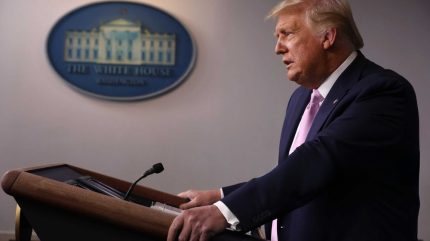
The last few days have been a rollercoaster for the pharmaceutical industry. Mexico and Canada were bracing themselves for the effects of double-digit tariffs from the US, only for President Donald Trump to pause the levies after striking a deal with the two countries.
China remained in the new administration’s crosshairs, however, with 10% tariffs imposed by the US on imports. Chinese President Xi Jinping responded by rolling out its own duties on US imports, including fuel.

Discover B2B Marketing That Performs
Combine business intelligence and editorial excellence to reach engaged professionals across 36 leading media platforms.
The Dow Jones Industrial Average slowed its dramatic fall in response to the pause on some of Trump’s tariffs, rebounding by the end of 4 February to recover most of its lost share price.
Trump initiated the sweeping tariffs to “hold Mexico, Canada, and China accountable to their promises of halting illegal immigration and stopping poisonous fentanyl and other drugs from flowing into our country”, as per a White House fact sheet. In doing so, the US Government has thrust the pharmaceutical manufacturing scene into uncertainty. Trump significantly paused the tariffs, as opposed to abandoning them.
Pharma reacts to tariffs
A statement from the Healthcare Distribution Alliance (HDA), which represents pharmaceutical distributors in the US, has said that tariffs on pharmaceuticals could lead to supply chain strain, higher drug costs, and manufacturers leaving the market.
“We ask the administration to consider establishing exemptions for pharmaceutical products and long implementation timelines to maintain the safe and efficient delivery of approximately ten million medicines and healthcare products every day,” a spokesperson for the HDA said.

US Tariffs are shifting - will you react or anticipate?
Don’t let policy changes catch you off guard. Stay proactive with real-time data and expert analysis.
By GlobalData“Distributors and generic manufacturers cannot absorb the rising costs of broad tariffs. As a result, the US will likely see new and worsened shortages of important medications and the costs will be passed down to payers and patients, including those in the Medicare and Medicaid programmes.”
The HDA said it supports federal investments to boost the manufacturing of pharmaceutical products in the US, improving supply chain resilience.
Pharmaceutical Research and Manufacturers of America (PhRMA) public affairs VP Megan Van Etten took a different stance, saying that whilst tariffs increase costs and reduce access, ensuring the US’ position of biopharmaceutical leadership should be the focus of government trade measures.
In an email to Pharmaceutical Technology, Van Etten stated: “President Trump is right to focus on improving the country’s health and safety. We are eager to work with the Trump administration to find solutions that reduce costs for patients and improve access.
“However, policymakers have historically excluded medicines from tariffs because they increase costs and reduce access. We share President Trump’s goal of ensuring we maintain our global leadership in biopharmaceutical innovation and manufacturing. As such, trade measures should focus on addressing unfair practices abroad and safeguarding our intellectual property to make sure the US retains its position as the world leader in bringing safe and effective medicines to market.”
John Murphy III, president and CEO of the Association for Accessible Medicines (AAM), commented in a statement that the generics and biosimilar market could be especially impacted. Around half of the generic medicines used by patients in the US are manufactured overseas.
“The global supply chain for generic and biosimilar medicines is critically important for US patients. From the base ingredients to the finished products, US medicines rely on a global supply chain that is already stressed and in need of strengthening. Tariffs on products from Canada, Mexico, and China could increase already problematic drug shortages,” Murphy said.
The AAM CEO added that generic manufacturers cannot absorb new costs and that the value of the generics market in the US would be negatively impacted by tariffs.
Medtech sector advocates for exemptions
Meanwhile, the Advanced Medical Technology Association (AdvaMed) shared its concerns on the potential impacts of tariffs on the medtech sector.
“An exemption was provided for most medical devices during President Trump’s first term with respect to the tariffs on China, and we are advocating for a similar approach this time,” the association said in a statement.
AdvaMed added that the heavy regulation in healthcare means “tariffs impact American companies similarly to an excise tax, which would lead to less R&D/innovation, layoffs, higher prices for the above-mentioned payors and patients, or all of the above”.
AdvaMed added that tariffs could hold back the innovation potential of the US medtech scene whilst boosting industry competitiveness in other countries.
Views from outside the US
Whilst US industry associations have been vocal about what the tariffs could mean for medical product supply, those in Europe have been less keen to speculate.
Although he has not officially announced tariffs on the European Union (EU) or the UK, Trump has threatened them both, stating they are “out of line”, however, the US President believes he can ‘work it out’ in the UK with Prime Minister Keir Starmer.
A spokesperson for the European Federation of Pharmaceutical Industries and Associations (EFPIA) declined to comment in an email to Pharmaceutical Technology on the US tariffs “as it would be speculation at this point”.
The Association of the British Pharmaceutical Industry (ABPI) also declined to comment on Pharmaceutical Technology, with a spokesperson saying: “We are not in a position to comment on potential impacts/speculations at this current moment.”




